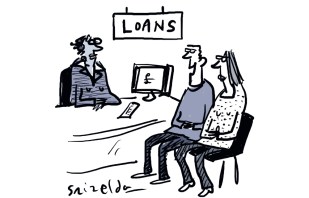My friend Tim Leunig is a cerebral thinker of the best kind. Though not party-political, he has worked for Tory chancellors and would give the same advice to governments of any stripe. Wikipedia calls him a prize-winning economist and that’s right, but he has a gadfly instinct and a remorselessly rational intellect that takes him into the deeps: into first principles, logical consequences and the reductiones ad absurdum of some of our trains of argument. He writes a substack (timleunig.substack.com) and it was his recent summary there of proposals he wrote as chief economist for the Onward thinktank that caught my eye.
‘I bought this house from savings that were taxed as I earned. Now you want to tax me because I have it. No!’
The proposals are for a radical reform of property taxation. They prompt this column. Because I’m not sure he’s right. Leunig says this: ‘Council tax and stamp duty are terrible taxes. They are unfair and unpopular, and both should be replaced with proportional property taxes. Council tax should be replaced by an annual tax on all houses, and stamp duty with an annual tax only on houses worth £500,000 or more.’
Both these taxes would be payable by owners, not (in rented property) by tenants. The tax on houses worth less than £500,000 would be proportionate to value, and a single rate would be set by (and payable to) the local council. The extra tax on houses worth more than £500,000 would be set by (and payable to) central government, and there would be two rates: one on property value from £500,000 to £1 million, and a higher one on value beyond £1 million.
I cannot argue with the logic here. Council tax is clumsy and produces grotesque results. Stamp duty gums up the housing market, hitting younger people at the wrong time as they try to move up the ladder; and it discourages older people from the downsizing that might otherwise make sense.
My doubts about Tim’s plan, and all those alternative reforms already suggested, is not that they don’t in fiscal terms do the job. They do. But in doing so they focus on and clarify a type of taxation for which human beings have a visceral if irrational dislike: the state taxing us not for what we earn or spend, but for what we have.
Our existing council tax system does this already, of course (or is supposed to), but in such a muddled way and with such random results in terms of who pays what and why that we tend to shrug it off. Any reform that intelligently relates the possession of property to the tax we pay will sharpen the sense of alarm. ‘I bought this house from savings that were taxed as I earned, and as I spend you will tax me on that money again. But now you want to tax me just because I have the house. No!’
Politicians should not underestimate how unsettling people find this; and the fact that we struggle to explain our own alarm, to formulate the argument or to justify it in logic, should not conceal its inchoate power. Let me try to explain.
Deep-rooted in the human breast is a longing for security. The unknown scares us. That we wish to make provision against future uncertainties is a fact to which almost the entire insurance industry owes its prosperity. Insurance is irrational unless you believe the insurer has miscalculated the odds in your favour, or you quantify peace of mind as a tradeable commodity. We admire the way squirrels bury little stores of nuts. We warm to the jackdaw building and feathering his nest. We shudder at the biblical warning about not laying up for ourselves treasures on Earth, where moth and rust do corrupt. We hate inflation for eating away what we’ve gathered.
As we grow older, we worry about old age and infirmity, and how we shall provide for ourselves. The archetypal picture – if you will – is of a nest, a burrow, a safe-deposit box, a treasure chest buried in the garden… a padlocked repository of some kind in which is safely stored our insurance against a rainy day. Can you understand me when I say that there’s a difference – only psychological, but a difference nevertheless – between the state’s saying to someone ‘As you earn, so we shall take a share’ or ‘As you spend, so we shall take a share’ and the state’s saying: ‘That’s a nice house, sonny. Give us some money’?
Real estate in Britain is so much more than roofs over people’s heads. For millions, their homes are their principal savings vehicles. A tax on the value of their homes is a tax on their savings, on what they have put aside, or what they hope to pass on to their children. As I feather my own nest, I’m reconciled to giving half the feathers I earn to the taxman; reconciled (should I buy feathers) to pay one feather in five in VAT. But the nest itself? They’re my feathers, dammit!

My own circumstances may seem a poor argument for this thesis. I own a house in the country and a flat in London, and two buy-to-lets. Why should I bridle more at the idea that government should tax the value of my properties than that they should hike the higher rates of income tax I pay? I’m not being rational, because even if the bottom line were the same either way, I’d still feel more threatened by tax on my possessions than by tax on my income or spending. My own irrationality demonstrates my case.
‘For heaven’s sake,’ Tim might say, ‘all we’re talking about is how to fund the local council and the services it provides.’ Indeed, but people don’t hypothecate like that. They’ll pay pro-rata for the electricity they use, but the running of the town hall? That’s just a tax. So I have a different message to Labour from Tim’s. Let well enough alone; and so far as possible, get your claws on the feathers before they reach the nest.








Comments